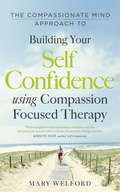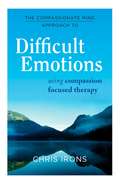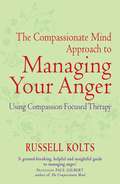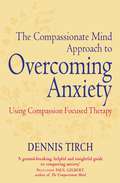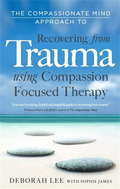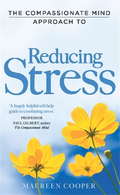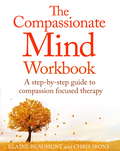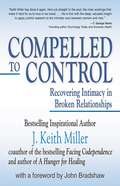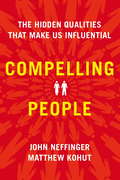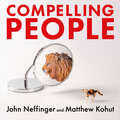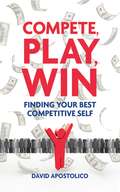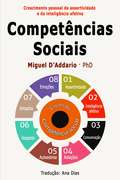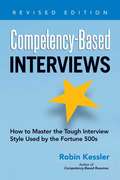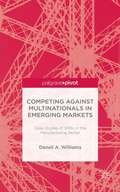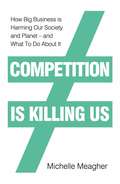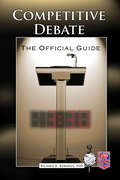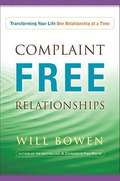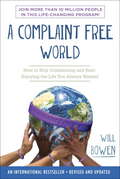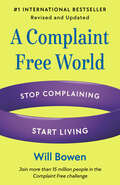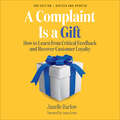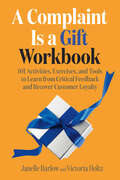- Table View
- List View
The Compassionate Mind Approach to Building Self-Confidence: Series editor, Paul Gilbert (Compassion Focused Therapy)
by Dr Mary WelfordMany of us have a tendency to measure our self-worth by comparing ourselves to others. But when we fail to reach our own, families, communities or societies 'ideals' this often results in feelings of inadequacy, anxiety and low mood. We may become self-critical, experience shame and a sense of being different from others. Although an improvement in 'self-esteem' is what we may feel we want this is not necessarily what we need. This is because self-esteem is often associated with times when things are going well but can fail us when things do not go to plan. In contrast self-confidence, built from self-compassion, can help us when things are going well and make us more resilient when things are difficult.This book uses the ideas and practices of Compassion Focused Therapy to help build self-confidence. Attention is also paid to difficulties that often come hand in hand with lack of self-confidence such as anxiety, depression, substance use and anger.
The Compassionate Mind Approach to Difficult Emotions: Using Compassion Focused Therapy (Compassion Focused Therapy)
by Chris IronsEmotions bring purpose, pleasure and meaning to our lives. However, for many people, they are synonymous with distress, pain and suffering. Anger and rage can wreck relationships and cause problems at work; anxiety can prevent us from socialising or engaging in things we would like to; sadness can feel overwhelming and never ending. These types of difficulties are often referred to as emotion regulation problems, and can prevent us from developing stable and happy relationships, communicating our needs, and flourishing.This practical self-help book based on Compassion Focused Therapy (CFT) will help you to take a new approach to managing difficult emotions. It outlines why we experience emotions, how they can be helpful but also how and why we can get in to struggles with them. It outlines the Compassionate Mind model, and guides you through a series of exercises that will help you to develop your compassion mind, and use this to develop more helpful emotion regulation strategies, and bring greater balance to your emotions.
The Compassionate Mind Approach to Difficult Emotions: Using Compassion Focused Therapy
by Chris IronsEmotions bring purpose, pleasure and meaning to our lives. However, for many people, they are synonymous with distress, pain and suffering. Anger and rage can wreck relationships and cause problems at work; anxiety can prevent us from socialising or engaging in things we would like to; sadness can feel overwhelming and never ending. These types of difficulties are often referred to as emotion regulation problems, and can prevent us from developing stable and happy relationships, communicating our needs, and flourishing.This practical self-help book based on Compassion Focused Therapy (CFT) will help you to take a new approach to managing difficult emotions. It outlines why we experience emotions, how they can be helpful but also how and why we can get in to struggles with them. It outlines the Compassionate Mind model, and guides you through a series of exercises that will help you to develop your compassion mind, and use this to develop more helpful emotion regulation strategies, and bring greater balance to your emotions.
The Compassionate Mind Approach to Managing Your Anger: Using Compassion-focused Therapy (Compassion Focused Therapy)
by Russell KoltsWe can all get angry from time to time but when it gets out of hand it can have a serious impact on many aspects of our lives. As well as having an impact on our physical and mental health and our ability to engage in healthy relationships, it can also potentially have an enormous impact on society. The media is rife with stories of domestic violence, tragic stories of shaken babies, road-rage incidents and bullying.Mounting evidence suggests that all this anger can be harmful to us in a number of different ways. As well as the enormously damaging impact chronic anger can have on our relationships with other people, it is being linked to health problems such as cardiovascular disease and irritable bowel syndrome (IBS) and mental illnesses such as depression and post-traumatic stress disorder (PTSD). This invaluable self-help guide will enable the reader to recognise their personal anger problems, gain an understanding of what lies behind their anger, and use techniques based on Compassion Focused Therapy (CFT) to deal with their anger more effectively. CFT was initially developed by Professor Paul Gilbert, author of The Compassionate Mind, to treat those with high levels of self-criticism. It uses the proven, research-based techniques of CBT and other therapies with a special focus on the importance of developing inner compassion, in order to alleviate feelings of shame, develop a more balanced outlook and promote resilience. It incorporates elements of mindfulness and Tibetan Buddhism with recent research on human development and studies of the brain. It is increasingly used to treat a wide range of emotional and psychological problems including depression, overeating, shyness, trauma, anxiety and anger.
The Compassionate Mind Approach to Overcoming Anxiety: Using Compassion-focused Therapy (Compassion Focused Therapy)
by Dennis TirchWe know what it's like to worry from time to time, but for some of us, our worrying can take over and have a serious impact on our lives. When our anxiety gets out of hand and starts to dominate our lives, affecting how we function and our general sense of wellbeing, it's time to do something about it. This accessible self-help guide provides the reader with a clear understanding of how problem anxiety develops, the kinds of problems it's causing them and sets out ground-breaking Compassion Focused Therapy (CFT) techniques to overcome their anxiety . CFT was initially developed by Professor Paul Gilbert OBE, author of the bestselling The Compassionate Mind which set out his ground-breaking approach, to treat those with high levels of shame and self-criticism. It uses the proven, research-based techniques of CBT and other therapies with a special focus on the importance of developing inner compassion, in order to alleviate feelings of shame, develop a more balanced outlook and promote resilience. It incorporates elements of mindfulness and Tibetan Buddhism with recent research on human development and studies of the brain. It is increasingly used to treat a wide range of emotional and psychological problems including depression, overeating, shyness, trauma, anxiety and anger.
The Compassionate Mind Approach to Recovering from Trauma: Using Compassion Focused Therapy (Compassion Focused Therapy)
by Deborah Lee Sophie JamesTerrible events are very hard to deal with and those who go through a trauma often feel permanently changed by it. Grief, numbness, anger, anxiety and shame are all very common emotional reactions to traumatic incidents such as an accident or death of a loved one, and ongoing traumatic events such as domestic abuse. How we deal with the aftermath of trauma and our own emotional response can determine how quickly we are able to 'move on' and get back to 'normality' once more. An integral part of the recovery process is not only recognising and accepting how our lives may have been changed but also learning to deal with feelings of shame - an extremely common reaction to trauma.'Recovering from Trauma' uses the groundbreaking Compassion Focused Therapy to help the reader to not only develop a fuller understanding of how we react to trauma, but also to deal with any feelings of shame and start to overcome any trauma-related difficulties.
The Compassionate Mind Approach to Reducing Stress
by Maureen CooperStress is an unavoidable part of life that we will all encounter at various times in our lives, be it due to a one-off event such as losing a job or the break-up of a relationship, or from facing long-term difficulties such as working in a stressful environment or caring for someone who is ill. How well we deal with stress will influence the extent to which it affects our lives. In this ground-breaking book, Maureen Cooper explains why we are designed to respond to stress in a certain way and why this can even be helpful at times. She goes on to explain, using practical examples and techniques, what we can do to change our stress response if it becomes overstimulated, thereby improving our sense of control and wellbeing. This self-help book is based on the Compassionate Mind Approach, which has been developed by Professor Paul Gilbert, a clinical psychologist who is internationally renowned for his research and clinical work on depression. The Compassionate Mind Approach combines proven, research-based Western therapy techniques such as CBT with Mindfulness, Tibetan Buddhist practices and recent research on human development and studies of the brain.
The Compassionate Mind Approach to Reducing Stress
by Maureen CooperStress is an unavoidable part of life that we will all encounter at various times in our lives, be it due to a one-off event such as losing a job or the break-up of a relationship, or from facing long-term difficulties such as working in a stressful environment or caring for someone who is ill. How well we deal with stress will influence the extent to which it affects our lives. In this ground-breaking book, Maureen Cooper explains why we are designed to respond to stress in a certain way and why this can even be helpful at times. She goes on to explain, using practical examples and techniques, what we can do to change our stress response if it becomes overstimulated, thereby improving our sense of control and wellbeing. This self-help book is based on the Compassionate Mind Approach, which has been developed by Professor Paul Gilbert, a clinical psychologist who is internationally renowned for his research and clinical work on depression. The Compassionate Mind Approach combines proven, research-based Western therapy techniques such as CBT with Mindfulness, Tibetan Buddhist practices and recent research on human development and studies of the brain.
The Compassionate Mind Workbook: A step-by-step guide to developing your compassionate self
by Chris Irons Dr Elaine BeaumontThere is good and increasing evidence that cultivating compassion for one's self and others can have a profound impact on our physiological, psychological and social processes. In contrast, concerns with inferiority, shame and self-criticism can have very negative impacts on these processes and are associated with poorer physical and mental health. The Compassionate Mind Workbook is for anyone who is interested in how compassion - in the form of ideas and practices derived from Compassion Focused Therapy (CFT) and other approaches - may help us to engage with, understand and ultimately, try to alleviate suffering. CFT utilises both Buddhist practices and Western psychological science. It draws on neuroscience, insights into emotion regulation and identity formation, interpersonal psychology and a range of psychotherapeutic models. CFT-based interventions can help people with a range of mental health problems develop compassion for themselves, be open to the compassion of others and develop compassion for others.This workbook is a step-by-step guide to CFT, in which the chapters build your understanding of yourself, the skills that give rise to a compassionate mind, and ways to work with whatever difficulties you're struggling with in life. The exercises, prompts and case stories in this book provide an understandable and practical way to develop compassion.
The Compassionate Mind Workbook: A step-by-step guide to developing your compassionate self
by Chris Irons Elaine BeaumontThere is good and increasing evidence that cultivating compassion for one's self and others can have a profound impact on our physiological, psychological and social processes. In contrast, concerns with inferiority, shame and self-criticism can have very negative impacts on these processes and are associated with poorer physical and mental health. The Compassionate Mind Workbook is for anyone who is interested in how compassion - in the form of ideas and practices derived from Compassion Focused Therapy (CFT) and other approaches - may help us to engage with, understand and ultimately, try to alleviate suffering. CFT utilises both Buddhist practices and Western psychological science. It draws on neuroscience, insights into emotion regulation and identity formation, interpersonal psychology and a range of psychotherapeutic models. CFT-based interventions can help people with a range of mental health problems develop compassion for themselves, be open to the compassion of others and develop compassion for others.This workbook is a step-by-step guide to CFT, in which the chapters build your understanding of yourself, the skills that give rise to a compassionate mind, and ways to work with whatever difficulties you're struggling with in life. The exercises, prompts and case stories in this book provide an understandable and practical way to develop compassion.
Compelled to Control: Recovering Intimacy in Broken Relationships
by J. Keith Millerthis exciting book breaks new ground in identifying the major cause of relationship failure as the need to control — in marriages and families, with friends and within organizations. Compelled to Control reflects Miller’s sweeping knowledge as a thinker, a speakers and a writer. Going far beyond “how to control a controller,” Miller speaks from the perspective of experience and personal change. ”When a controller has the sense of life being out of control,” he says, “he or she reacts with an even stronger need to ‘get things under control’…usually with the negative result of alienating the people who matter the most.” Miller tackles this deeply denied, seemingly universal phenomenon with compassion and offers a way out of the dilemma. He tells who to approach broken relationships in new ways, leaving behind destructive patterns of perfectionism and self-justification. Keith miller is one of those rare writers who can combine intellectual acuity with deeply felt insight born of his own struggle for authenticity.Compelled to Control is an impressive contribution to the literature of recovery and personal change.
Compelling People: The Hidden Qualities That Make Us Influential
by John Neffinger Matthew Kohut'This is not just another pop-psych book: it's the first book to capture and share the insights from all the recent groundbreaking research on how we judge and persuade each other. And it translates that into simple, practical terms anyone can use to build more effective relationships at the office or home' Amy CuddyHOW PEOPLE JUDGE YOU - AND HOW TO COME OUT LOOKING GOOD Everyone wants to know how to be more influential. But most of us don't really think we can have the kind of magnetism or charisma that we associate with someone like Bill Clinton or Oprah Winfrey unless it comes naturally. In Compelling People - now required reading and Harvard Business School - John Neffinger and Matthew Kohut show that this isn't something we have to be born with, it's something we can learn. They trace the path to influence through a balance of strength and warmth. Each seems simple, but only a few of us figure out the tricky task of projecting both at once. Drawing on cutting-edge social science research as well as their own work with Fortune 500 executives, members of Congress, TED speakers and Nobel Prize winners, Compelling People explains how we size each other up - and how we can learn to win the admiration, respect, and affection we desire.
Compelling People: The Hidden Qualities That Make Us Influential
by John Neffinger Matthew Kohut'This is not just another pop-psych book: it's the first book to capture and share the insights from all the recent groundbreaking research on how we judge and persuade each other. And it translates that into simple, practical terms anyone can use to build more effective relationships at the office or home' Amy CuddyHOW PEOPLE JUDGE YOU - AND HOW TO COME OUT LOOKING GOOD Everyone wants to know how to be more influential. But most of us don't really think we can have the kind of magnetism or charisma that we associate with someone like Bill Clinton or Oprah Winfrey unless it comes naturally. In Compelling People - now required reading at Harvard Business School - John Neffinger and Matthew Kohut show that this isn't something we have to be born with, it's something we can learn. They trace the path to influence through a balance of strength and warmth. Each seems simple, but only a few of us figure out the tricky task of projecting both at once. Drawing on cutting-edge social science research as well as their own work with Fortune 500 executives, members of Congress, TED speakers and Nobel Prize winners, Compelling People explains how we size each other up - and how we can learn to win the admiration, respect, and affection we desire.
Compete, Play, Win: Finding Your Best Competitive Self
by David ApostolicoThis book is a sociological examination of competition and the competitive drive, told from the viewpoint of a competition freak. The author explores the energy and force behind the need to compete, and what the consequence of that need is. In the chapter "Sperm Wars," Apostolico discusses conception as the beginning of the competitive nature of humans, while also discussing the competition for a mate that precedes it. Through this, he sets up the idea of a biological necessity for competition and how evolution has modified and enhanced that drive. In a later chapter called "Competitive Nature," Apostolico participates in as many competitive endeavors as possible (eating contests, drag races, dog shows, etc.) and answers a set of 10 questions about each, concluding with, "Can a competitive junkie ever truly feel satisfied?"
Competências Sociais
by Miguel D'AddarioAs competências sociais (por vezes denominadas como competência social) não têm uma definição única e determinada, uma vez que existe uma confusão conceptual a esse respeito, já que não existe consenso por parte da comunidade científico-social; no entanto, tal poderá ser definido segundo as suas principais caraterísticas, e estas salientam que as competências sociais são um conjunto de condutas adquiridas de forma natural (e que por isso podem ser ensinadas), que se manifestam em situações interpessoais, socialmente aceites (o que implica ter em conta normas sociais e normas legais do contexto sociocultural no qual agimos, bem como critérios morais), e orientadas para a obtenção de reforços ambientais (reforços sociais) ou autoreforços. Não em vão, também são comportamentos associados aos animais, demonstrados nas relações com outros seres da mesma espécie. No caso das pessoas, estas dotam o indivíduo que as possui de uma maior capacidade para cumprir os objetivos que pretende, mantendo a sua autoestima sem ferir a das pessoas que o rodeiam. Estas condutas baseiam-se fundamentalmente no domínio das competências comunicativas, e requerem um bom autocontrolo emocional por parte de quem atua.
Competency-Based Interviews: How to Master the Tough Interview Style Used by the Fortune 500s (Competency-based Ser.)
by Robin KesslerPeople interviewing for jobs today often fail because they are using yesterday's strategies. Technology is becoming more sophisticated and virtual assessment centers are being used to assess how strong candidates are in key competency areas. Global competencies are being used to help organizations choose people for international assignments or simply to work on diverse international teams. The best employers are constantly changing the way interviews are done. This newly revised edition of Competency-Based Interviews offers you a new and more effective way to handle the tough new interviews so that you will emphasize the knowledge, skills, and abilities that you have and that employers demand. <P><P> Preparing for a competency-based interview will give you the strategy you need to: <li>Be selected for the most competitive positions <li>Win the best job at a new organization <li>Get a great first job or internship <li>Be chosen for that critical promotion in your current organization <li>Take control of your career path <li>Increase your salary <li>Secure more interesting assignments and more interesting work
Competing: Understanding and Winning the Strategic Games We All Play
by Harvey L. RubenCompetition is an inescapable fact of life. From the nursery to the nursing home, from the bedroom to the boardroom, in politics and business and school and sports and everyday conversation, human beings are in constant competition with each other. We compete for jobs, grades, social position, sex, friendship, money, power, even love. So pervasive is the competitive urge that it frequently governs our behavior even when we are unaware of its influence. From the time we are very small, it is a fundamental aspect of the process by which we develop our self-esteem, our social assurance, our very identity. Competition is unavoidable.
Competing against Multinationals in Emerging Markets: Case Studies of SMEs in the Manufacturing Sector
by Densil A. WilliamsCompeting against Multinationals in Emerging Markets provides a comprehensive set of lessons which successful small firms have adopted in order to survive and prosper in an increasingly hostile competitive manufacturing sector where large firms are mostly dominant.
Competition is Killing Us: How Big Business is Harming Our Society and Planet - and What To Do About It
by Michelle MeagherWe live in the age of big companies where rising levels of power are concentrated in the hands of a few. Yet no government or organisation has the power to regulate these titans and hold them to account. We need big companies to share their power and we, the people of the world, need to reclaim it. In Competition is Killing Us, top business and competition lawyer Michelle Meagher establishes a new framework to control capitalism from the inside in order to make it work for the many and not just the few. Meagher has spent years campaigning against these multi-billion and trillion dollar mammoths that dominate the market and prioritise shareholder profits over all else; leading to extreme wealth inequality, inhumane conditions for workers and relentless pressure on the environment.In this revolutionary book, she introduces her wholly-achievable alternative; a fair and comprehensive competition law that limits unfair mergers, enforces accountability and redistributes power through stakeholder governance.
Competitive Debate: The Official Guide
by Richard EdwardsThe bible for debaters and their coaches. Nearly every high school and college in America has a debate club and/or a debate team. There are hundreds of competitions at the county and state level, culminating in heated national competitions. Yet, at many high schools and colleges, coaches are drawn from the history or English departments with little or no experience in the highly structured procedures of this popular discipline. And while competitive debate has been growing each year as a prime academic activity, there have been no popular handbooks to help students and coaches prepare for contests effectively and efficiently. Practical and authoritative, this guide includes not only tips and guidelines for effective preparation and delivery, but full-length, actual transcripts of successful competitions in each format. Endorsed by the two national governing bodies for competitive debate—the National Federation of State High School Associations and the National Forensic League—and priced for the budget-conscious student and high school teacher alike, Competitive Debate: The Official Guide is set to become the instructional &“bible&” for tens of thousands of present and future debaters and their coaches. Inside, Dr. Richard Edwards—award-winning debate coach, professor, former competitive debate judge, and author—leads readers through the three popular formats of competitive debate: • Policy Debate • Lincoln-Douglas Debate • Public Forum Debate
Complaint Free Relationships: How to Positively Transform Your Personal, Work, and Love Relationships
by Will BowenA revolutionary approach to improving every relationship in your life, Complaint Free Relationships picks up where the internationally successful A Complaint Free World left off, with all-new methods to help you overcome toxic habits and build strong, successful connections with others. The original Complaint-Free movement has exploded into an international phenomenon, with 5.5 million people in more than 80 countries taking the pledge to create a complaint-free life, as well as national media attention. As this movement expands, it is clear that the real focus of achieving true complaint-free living lies in our relationships. People complain to bond with others. It's easy to feel connected by common annoyances. But most complaining is about people, and this leads to negative and unhealthy foundations for our relationships with others--from family, lovers and friends to our more casual connections with people in our daily lives. Complaint-Free Relationships provides insight and helpful tools to see, understand, and engage in our relationships through the lens of complaint-free living. It incorporates new studies about complaining, inspiring and illuminating stories from Will Bowen's experience both as a minister and founder of the Complaint Free movement, and practical exercises at the end of each chapter. By providing the tools you need to escape the trap complaining creates--feeling unfulfilled and inadequate--Complaint-Free Relationships offers new clarity and encourages you to create happy, stimulating and mutually satisfying relationships.
A Complaint Free World: How To Stop Complaining And Start Enjoying The Life You Always Wanted
by Will Bowen"A Complaint Free World is an engaging, enjoyable, easy-to-read reminder that the only permanent, constructive changes you can make in the world are the changes that you make in yourself."-Gary Zukav, author of The Seat of the Soul and Soul to Soul A SIMPLE PLAN... A LIFE-CHANGING RESULT... A HAPPIER LIFE ·What exactly is a complaint? (Chapter 1) ·Why is complaining destructive? (Chapters 2-3) ·How can I get others around me to stop complaining? (Chapter 3) ·How can we affect social change if we don't complain? (Chapter 5) ·Why is it so hard to stop complaining? (Chapters 4-6) ·What happens once I no longer complain? (Chapter 8) You may have pondered these questions yourself. Since the Complaint Free program began, Will Bowen has received hundreds of calls, letters and emails asking these and other important questions. In A Complaint Free World: How to Stop Complaining and Start Enjoying the Life You Always Wanted, he provides practical answers and includes inspiring and touching stories from people just like you who have transformed their lives by becoming Complaint Free. Over 6 million people in more than 80 countries have taken the Complaint Free challenge and their lives are a testament to the positive effects of this simple idea. Find out how forming the simple habit of not complaining can transform your health, relationships, career and life. In your hands, you hold the secret to transforming your life. Big words? Yes, but this is a plan that has already proven itself with millions of people around the world. Pastor Will Bowen developed the life-changing A Complaint Free World plan based on the simple idea that good things will happen for you in abundance if you can just leave your grumbling behind. In a Sunday-morning sermon, Will told his congregation he wanted to make the world a complaint-free zone and, to prove he was serious, he passed out purple bracelets to each church member and offered them a challenge. "If you catch yourself complaining, take the bracelet and move it to the other wrist." Now, less than a year later, more than six million people have taken up the challenge, trying to go twenty-one consecutive days without complaining, criticizing, or gossiping, and in so doing, forming a new, positive habit. By changing your words, you can change your thoughts and then begin to create your life by design. People have shared stories with Will of chronic pain relieved, relationships healed, careers improved, and becoming an overall happier person. Less pain, improved health, satisfying relationships, a better job, being more serene and joyous--sound good? It's not only possible, it's probable. Consciously striving to reformat your mental hard drive is not easy, but you can start now by using the steps Bowen presents here. In this book, you can learn what constitutes a complaint, why we complain, what benefits we think we receive from complaining, how complaining is destructive to our lives, and how we can get others around us to stop complaining. You will learn the steps to eradicating this poisonous form of expression from your life. If you stay with it, you will find that not only will you not complain, but others around you will cease to do so as well. In a short period of time, you can have the life you've always dreamed of having.From the Hardcover edition.
A Complaint Free World, Revised and Updated: Stop Complaining, Start Living
by Will BowenNow revised and updated for our modern world, the &“complaint free&” philosophy teaches you how to stop complaining, become more positive, and live the life you&’ve always dreamed about.It all started more than fifteen years ago with a simple purple bracelet. Will Bowen passed out bracelets and offered people a challenge: If you catch yourself complaining, take the bracelet off and move it to the other wrist, thereby making yourself aware of just how often you complain. The end goal was to go twenty-one consecutive days without complaining. A Complaint Free World develops this idea further, offering practical advice and simple principles to transform your life for the better. The philosophy started a movement, with millions committing to going twenty-one days and beyond without complaining, criticizing, or gossiping. Through changing their words, many found they had changed their thoughts, resulting in healed relationships, improved careers, and a higher level of happiness. A Complaint Free World explains what constitutes a complaint, why we complain, what benefits we think we receive from complaining, how complaining is destructive to our lives, and how we can get others around us to stop complaining. In this revised and updated edition, Will presents the steps to becoming Complaint Free and addresses the modern issues that make it harder—and more worthwhile—than ever, including reflections on how the internet has changed how we complain (and how we can resist) and inspiring new testimonials from people who have improved their relationships, workplaces, and attitudes by becoming Complaint Free. Stop complaining. Start living.
A Complaint Is a Gift: How to Learn from Critical Feedback and Recover Customer Loyalty
by Janelle BarlowThe third edition of this bestseller (over 275,000 copies sold) builds on the tested formula that helps organizations recognize the value of complaints using updated examples and concepts in the age of COVID-19. The first edition of A Complaint Is a Gift introduced the revolutionary notion that customer complaints are not annoyances to be dodged, denied, or buried but are instead valuable pieces of feedback-not to mention your best bargain in market research. Complaints provide a feedback mechanism that can help organizations rapidly and inexpensively strengthen products, service style, and market focus. Most importantly, complaints that are well received create customer loyalty.This new edition condenses the tried and true eight-step formula into a tighter, more efficient three-step formula. From her work with clients, the author has updated industry-specific complaint examples and added in new concepts, such as a process that enables employees to handle complaints with increased emotional resilience-something that is sorely needed since dealing with increasingly difficult customers is a common occurrence in the wake of the COVID-19 pandemic. Handling complaints doesn't have to be a negative, soul-crushing experience. Janelle Barlow gives the right tools to treat each of them as a source of innovative ideas that can transform your business.
A Complaint Is a Gift Workbook: 101 Activities, Exercises, and Tools to Learn from Critical Feedback and Recover Customer Loyalty
by Janelle Barlow Victoria HoltzBased on the bestselling A Complaint Is a Gift (over 275,000 copies sold), this accompanying workbook offers actionable tools that help individuals and organizations transform even the most extreme complaints into gifts that drive their business forward.A Complaint Is a Gift introduced the revolutionary notion that customer complaints are not annoyances to be dodged, denied, or buried but are instead valuable pieces of feedback-not to mention your best bargain in market research. Complaints provide a feedback mechanism that can help organizations rapidly and inexpensively strengthen products, service style, and market focus. Most importantly, complaints that are well received create customer loyalty.Built to be interactive and immersive, the workbook teaches a set of practices, approaches, and tools that anyone can use to navigate fraught customer-facing interactions. It allows readers to practice Janelle Barlow's updated, more efficient three-step formula and enables employees to handle complaints with increased emotional resilience rather than taking them as personal attacks. A Complaint Is a Gift Workbook is packed with the necessary tools to view and treat complaints as a source of innovative ideas that can transform your business.
